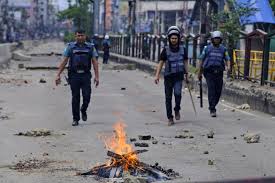
In the wake of widespread protests in Bangladesh, the number of arrests has surpassed 1,100, according to an AFP tally released on Tuesday. The unrest, triggered by demonstrations over employment quotas, has also resulted in at least 168 deaths, including several police officers, as per a separate AFP count from police and hospitals.
The violence began as a student-led movement against politicized admission quotas for coveted government jobs. The situation escalated into one of the most severe periods of unrest during Prime Minister Sheikh Hasina’s tenure. In response, authorities have imposed a curfew, deployed soldiers nationwide, and instituted a sweeping internet blackout since Thursday to curtail information flow.
On Sunday, the Supreme Court reduced the number of reserved jobs for specific groups, including descendants of “freedom fighters” from Bangladesh’s 1971 liberation war against Pakistan. Despite these measures, the situation remains tense, with military personnel maintaining a strong presence in the capital, Dhaka, and key roads being blocked with barbed wire.
The student group spearheading the protests announced a temporary suspension of their demonstrations on Monday, citing the high cost of reform. The decision came as the army chief claimed the law and order situation had been brought “under control.”
The arrest figures are notable, with at least 200 people detained in Narayanganj and Narsingdi, 80 in Bogra, 168 in Gazipur, 75 in Rangpur, and 60 in Barisal. The arrest count in Dhaka alone was recorded at 532, bringing the total to 1,115.
Despite the curfew, daily life in some areas continues, with increased numbers of rickshaws on the streets. Rickshaw driver Hanif, reflecting the struggles faced by many, said, “I did not drive rickshaws the first few days of curfew, but today I didn’t have any choice. If I don’t do it, my family will go hungry.”
Sources By Agencies


